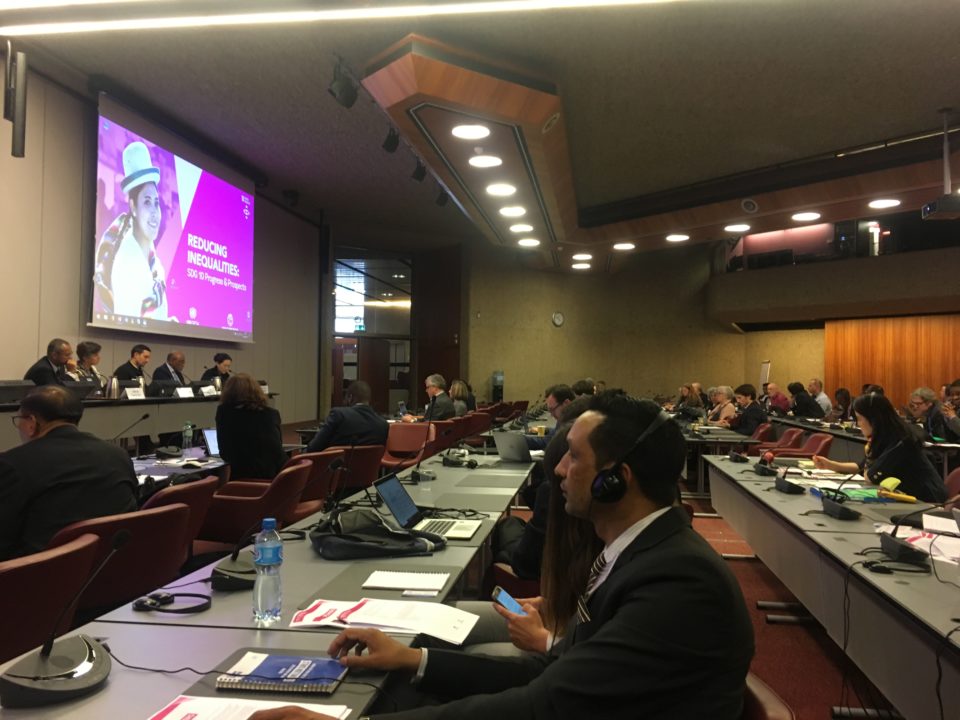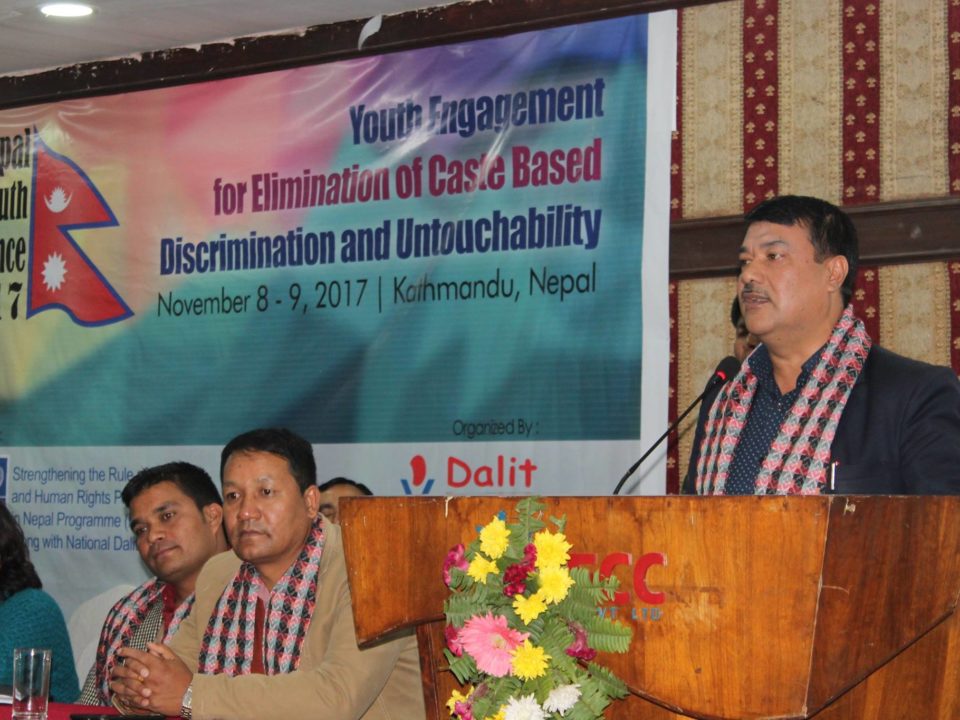Nepal People’s Forum on Sustainable Development 2019 Thematic Statement: The 2030 Agenda/SDGs
August 29, 2019Nepal has completed most of the groundwork for implementation of SDGs. National Planning Commission of Nepal came up with SDGs Status and Road Map (2016-2030) identifying 489 national indicators and set the targets to achieve by the end of 2030. We welcome the formation of high-level institutions at the national level (SDGs Steering Committee; Implementation, Coordination and Monitoring Committee; and 8 Thematic Committees). National Governments has tried to mainstream SDGs into 15th National Development Plan (2019/20-2023/24) and codifying national budgets. Needs Assessment, Costing and Financing Strategy for SDGs tried to analyze the needs of finance and its gaps. Nepal participated in the Voluntary National Review (VNR) process in 2017, which is important per se. Government, UN Agencies and civil society actors are involved in making aware the province governments, local governments and local actors on SDGs. News laws formulated by the government to implement fundamental rights are instrumental to achieving SDGs in the country. Major groups including women and girls, persons with a disability, indigenous people, youth, and CSOs have been working on SDGs through their own initiatives.
Though different initiatives are going on in achieving SDGs in the country, limited resources, capacity, technology, and innovations are becoming barriers in realizing SDGs in the country. Identifying goal-specific programs and cross-cutting interventions, and their implementation and monitoring are other challenges. Remittance based economy, the slow pace of development, increasing multiple inequalities, adverse impacts of climate change, natural disasters, environmental degradations, regional imbalance of development, the transformation from unitary to the federal system, poor public service delivery, political accountability, rampant corruption, and poor governance are the major challenges to achieve SDGs. Development of meaningful partnership of development actors, lack of awareness about the SDGs at the local level and shrinking civic spaces are also the challenges.
After successful implementation of MDGs, the United Nations adopted the 2030 Agenda/Sustainable Development Goals (SDGs) with 17 global goals and 169 targets. SDGs is very important for LDCs like Nepal. Even though Goals and targets are ambitious they are progressive and human rights friendly and we believe they can transform our world by establishing peaceful, just, equitable, inclusive and sustainable societies if we want to translate the goals into actions.
Leave No One Behind, which is the core principle of the 2030 agenda has not been fully internalized in public policies, plans, and budgets. Old age group, Women and girls, LGBTIQ, Dalits, Madhesi, Marginalized Indigenous Peoples, Muslims, people living in remote areas, People Living with Disability, victims of conflict and disasters, People with chronic diseases, and poor people are still deprived. Despite having a majority government, the country is not able to attract new investments. Province governments are struggling for institutionalization and the process of localizing SDGs is not satisfactory. Business as usual, impunity, Caste system and patriarchy, the negative influence of neo-liberalization, trade imbalance are deep-rooted systemic barriers for inclusive and just development in the country. The country is failed to establish disaggregated database system. There will be 5.45 million US Dollar (Rs. 585 billion) financial gap every year to achieve SDGs. Policies, laws, and programming are being made, but the process is no inclusive, open and participatory. The pace of development is slow, uneven, not inclusive and not environment-friendly. On the other hand, regional and global progress report of SDGs witnessed that the progress of SDGs at regional level and global level are not satisfactory. The most urgent area for action is climate change, the impacts of which will be catastrophic and irreversible.
The Nepal People’s Forum of Sustainable Development 2019 believes that the 2030 Agenda/SDGs is a foundation to create a prosperous Nepal and happy Nepali by economic and social transformation and environment safeguard.
Established mechanism of SDGs Implementation at all Level ensuring Participation of Majors groups Nepal i. e Youth, women &girls, Dalit, Indigenous peoples, old age group, Farmer, Muslim, others Cluster 18th identified majors group by the Nepal Peoples Forum on Sustainable Development to ensure Gender Equality and Social Inclusion (GESI ) Mainstreaming in the implementation Monitoring and evaluation.
Call for Action
- We call on all development actors including Governments to own SDGs, fulfill their national and international commitments and demonstrate their actions in achieving SDGs. We call on all the actors to mobilize their resources to poor, women, marginalized communities and backward areas. We further urge the government and parliament members to make better policies, laws, and regulation to enforce the provisions of the constitution in the real sense and show their full commitment to Leave No One Behind principle.
- We call on the Government to develop an inclusive macro-economic development framework and implement self-reliant development initiatives to reduce all forms of poverty, inequalities, and dependencies. Rapid, sustainable and employment-oriented economic growth; ensuring access to affordable and quality education and health services; building resilient settlements and cities; increasing productivity and production; ensuring adequate social protection; ensuring rule of law and access to justice; sustainable utilization of natural resources; tourism development; and people-centric governance are key to achieve SDGs in the country. Heavy reform is needed in planning and budgeting system and there should be strong monitoring and budget tracking system of development projects.
- We call on all the development actors to overcome the structural causes and systemic barriers of poverty, inequality, and underdevelopment such social, economic and political exclusions; gender inequality; corruption; poor governance; and lack of implementation of policies, plans, and budgets. Conflict sensitive development and maximizing inclusivity are needed to achieve sustained peace in the country. We urge the Government to take maximum benefits from the economic development of two neighboring countries and maintain balance relation with two neighboring countries and take benefits from regional inter-governmental institutions.
- We call on Government and international communities to increase investment in preparedness and preventive measures to check the loss and damages from natural disasters and protect the victims from the right based approach. We call all the industrialized countries to support the problems created by global warming and climate change and fulfill their international commitments. Further, we call on two neighboring countries India and China to reduce the emission of GHGs. On the hand, we call on communities and development actors to protect the environment, biodiversity and start a culture of living in harmony with nature. We want to draw the attention of all international development actors to be serious on climate actions and environmental related goals (Goal 6, 7, 12, 13, 14, 15).
- We believe the Government is the main responsible actor in achieving SDGs national targets, but we urge the government to break the silos and build culture of partnership. We urge Institutional mechanisms to be proactive and more functional. We urge the government to build functional partnership with civil society Major Groups, private sector, international communities, and province and local governments and clarify their roles. We urge the government to improve the enabling environment for the civil society actors, academic society, think tanks, business society, and international development partners. We ask province and local governments to establish mechanisms to institutionalize the SDGs in their territories.
- We urge civil society Major Groups and stakeholders to be more united, vibrant and innovative and strengthen their watchdog roles and make the government and other actors accountable. We urge the Government to become the member of Open Government Partnership and to strengthen constitutional bodies, especially the National Human Rights Commission, Commission of Investigation of Abuse of Authorities and other anti-corruption bodies.
- We urge the federal government to build strong governance, coordination, and cooperation system and practices among the ministries and build up cooperative partnership with local and provincial governments and end the confusions and misunderstanding with province governments in terms of the delegation of power, authorities, and resources. We believe effective localization of SDGs and the roles of local governments are vital to achieving SDGs in the country. We urge Governments to make their delivery types of machinery more effective and people-centered.
- We urge federal, provincial and local governments to strengthen their statistical system to generate disaggregated, up to date, reliable and accessible database system to monitor the progress of SDGs in the country.
- We urge Governments to establish inclusive, participatory and robust monitoring system for effective implementation in three-tier governments and track the progress of SDGs in the country. We urge the parliaments and related parliamentary committees, National Human Rights Commissions and other constitutional bodies and media to become vibrant to achieving SDGs.
- We urge the federal government to ensure the VNR process more open, transparent, inclusive and participatory. Also, we call on local governments and provincial governments to practice voluntary review processes. We call on UNs to reform HLPF and regional forums and make them accountable mechanism rather limiting to sharing the country progresses and experiences. We suggest making better use of regional forums such as Asia Pacific Forum on Sustainable Development; focusing on interlinkages between goals; and ministerial declarations that capture the discussions of the annual Forum and identify follow-up action. The second phase of SDGs implementation must show quality as well as seriousness in addressing the obstacles to achieving the SDGs.
- We urge the Governments to improve the tax system, ensure the progress tax and expand the domestic resource mobilization. OECD countries are urged to fulfill their commitments to provide 0.7 percent GNI for developing countries and provide more resources to fulfill the financial gaps to achieve national targets. Money is spent in the name of modernizing nuclear arsenals should be used to help end poverty, protect the climate, build global peace and achieve sustainable development goals. We urge the international community to end growing tensions between trade and investment regimes and human rights obligations, between tax avoidance and illicit financial flows and the vital role of public finance throw into sharp relief massive governance failures at the national and global levels. Similarly, we ask the UN to guarantee the trouble-free and equitable access of Nepal to international financial resources, development cooperation, trade, and transit facility as being LDC and LLDC.
- We call on UN and all the member states for renewed commitment and accelerated action to deliver the SDGs in time. A rights-based approach to sustainable development is an obligation of all Member States, grounded in legally binding international human rights framework. They must strengthen the meaningful participation of all rights holders at all levels, with a focus on the most marginalized.
- Urgent actions are required to accelerate SDG implementation and accountability; governments must tackle structural barriers, such as patriarchy, caste system, militarism, neoliberal capitalism, fundamentalism, authoritarianism, and climate change, and ensure that efforts benefit those who are systematically excluded.
- The international community should address the new threats to SDG implementation in line with its mandate to identify emerging issues, such as climate change, a reduced pace of economic growth, the threat of a further decline in the economy, and the “double-edged” sword of new technologies.
- We call to government to localization of SDGs with an action-oriented partnership between Non- Government Agency or CSO or Private sector
- We call to government, UN Agency, and CSO to make used single data Portal to the collection where is needy finical, implementation and status or SDGs
- We call to Non -government and private sector to feel that SDGs is our Agenda and play a vital role in implementation action localization. Nepal Peoples Forum for sustainable Development review the Local to national SDGs Implementation and evaluation from peoples perspective in seven Provincial levels and Organized final conference to sensitizes, concern stakeholder to batter implementation
On behalf of Agenda 2030/SDG Thematic Group
SUNDAR BAHADUR SHENI
Co-Founder /President
Shenisundar23@gmail.com/info@dya.org.np
Dalit Youth Alliance (DYA)


